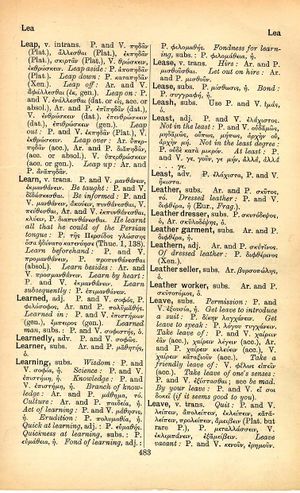leave: Difference between revisions
(CSV4) |
m (Text replacement - "[[λείπω|λείπειν" to "λείπειν") |
||
| Line 9: | Line 9: | ||
<b class="b2">By your leave</b>: P. and V. εἴ σοι δοκεῖ (<b class="b2">if it seems good to you</b>). | <b class="b2">By your leave</b>: P. and V. εἴ σοι δοκεῖ (<b class="b2">if it seems good to you</b>). | ||
'''v. trans.''' | '''v. trans.''' | ||
<b class="b2">Quit</b>: P. and V. | <b class="b2">Quit</b>: P. and V. [[λείπω|λείπειν]], [[ἀπολείπω|ἀπολείπειν]], [[ἐκλείπω|ἐκλείπειν]], [[καταλείπω|καταλείπειν]], [[προλείπω|προλείπειν]], ἀμείβειν (Plat. but rare P.), P. μεταλλάσσειν, V. ἐκλιμπάνειν, ἐξαμείβειν. | ||
<b class="b2">Leave vacant</b>: P. and V. κενοῦν, ἐρημοῦν. | <b class="b2">Leave vacant</b>: P. and V. κενοῦν, ἐρημοῦν. | ||
<b class="b2">You have left no hope among us</b>: V. οὐδʼ ἐλλέλοιπας ἐλπίδα (Eur., ''El.'' 609). | <b class="b2">You have left no hope among us</b>: V. οὐδʼ ἐλλέλοιπας ἐλπίδα (Eur., ''El.'' 609). | ||
<b class="b2">Bequeath</b>: Ar. and P. [[καταλείπω|καταλείπειν]], V. | <b class="b2">Bequeath</b>: Ar. and P. [[καταλείπω|καταλείπειν]], V. [[λείπω|λείπειν]] (Eur., ''Alc.'' 688). | ||
<b class="b2">Leave alone, let be</b>: P. and V. ἐᾶν. | <b class="b2">Leave alone, let be</b>: P. and V. ἐᾶν. | ||
<b class="b2">Leave behind</b>: Ar. <b class="b2">and B.</b> ὑπολείπειν. | <b class="b2">Leave behind</b>: Ar. <b class="b2">and B.</b> ὑπολείπειν. | ||
| Line 19: | Line 19: | ||
<b class="b2">Leave go of</b>: P. and V. μεθιέναι (acc.), ἀφιέναι (acc.), ἀφίεσθαι (gen.), Ar. and V. μεθίεσθαι (gen.). | <b class="b2">Leave go of</b>: P. and V. μεθιέναι (acc.), ἀφιέναι (acc.), ἀφίεσθαι (gen.), Ar. and V. μεθίεσθαι (gen.). | ||
<b class="b2">Leave in</b> (<b class="b2">a place</b>): P. ἐγκαταλείπειν (absol.). | <b class="b2">Leave in</b> (<b class="b2">a place</b>): P. ἐγκαταλείπειν (absol.). | ||
<b class="b2">Leave in the lurch</b>: P. and V. | <b class="b2">Leave in the lurch</b>: P. and V. [[λείπω|λείπειν]], [[καταλείπω|καταλείπειν]], [[προλείπω|προλείπειν]], προδιδόναι, ἐρημοῦν, Ar. and P. προϊέναι (or mid.). | ||
<b class="b2">Leave off</b>: v. trans., P. and V. μεθιέναι; v. intrans., see [[cease]]. | <b class="b2">Leave off</b>: v. trans., P. and V. μεθιέναι; v. intrans., see [[cease]]. | ||
<b class="b2">Leave out</b>: P. and V. παραλείπειν (Eur., ''Hel.'' 773), παριέναι, [[ἐκλείπω|ἐκλείπειν]], ἐλλείπειν. | <b class="b2">Leave out</b>: P. and V. παραλείπειν (Eur., ''Hel.'' 773), παριέναι, [[ἐκλείπω|ἐκλείπειν]], ἐλλείπειν. | ||
Revision as of 06:39, 7 August 2017
English > Greek (Woodhouse)
subs.
Permission: P. and V. ἐξουσία, ἡ. Get leave to introduce a suit: P. δίκην λαγχάνειν. Get leave to speak: P. λόγου τυγχάνειν. Take leave of: P. and V. χαίρειν ἐᾶν (acc.), χαίρειν λέγειν (acc.), Ar. and P. χαίρειν κελεύειν (acc.), V. χαίρειν καταξιοῦν (acc.). Take a friendly leave of: V. φίλως εἰπεῖν (acc.). Take leave of one's senses: P. and V. ἐξίστασθαι; see be mad. By your leave: P. and V. εἴ σοι δοκεῖ (if it seems good to you). v. trans. Quit: P. and V. λείπειν, ἀπολείπειν, ἐκλείπειν, καταλείπειν, προλείπειν, ἀμείβειν (Plat. but rare P.), P. μεταλλάσσειν, V. ἐκλιμπάνειν, ἐξαμείβειν. Leave vacant: P. and V. κενοῦν, ἐρημοῦν. You have left no hope among us: V. οὐδʼ ἐλλέλοιπας ἐλπίδα (Eur., El. 609). Bequeath: Ar. and P. καταλείπειν, V. λείπειν (Eur., Alc. 688). Leave alone, let be: P. and V. ἐᾶν. Leave behind: Ar. and B. ὑπολείπειν. Be left behind (in a contest): P. and V. λείπεσθαι, V. ἐλλείπεσθαι, Ar. and P. ὑπολείπεσθαι. Leave for decision: see leave to. Leave go of: P. and V. μεθιέναι (acc.), ἀφιέναι (acc.), ἀφίεσθαι (gen.), Ar. and V. μεθίεσθαι (gen.). Leave in (a place): P. ἐγκαταλείπειν (absol.). Leave in the lurch: P. and V. λείπειν, καταλείπειν, προλείπειν, προδιδόναι, ἐρημοῦν, Ar. and P. προϊέναι (or mid.). Leave off: v. trans., P. and V. μεθιέναι; v. intrans., see cease. Leave out: P. and V. παραλείπειν (Eur., Hel. 773), παριέναι, ἐκλείπειν, ἐλλείπειν. Be left over: Ar. and V. περιλείπεσθαι; see remain. Leave to (for decision, etc.): Ar. and P. ἐπιτρέπειν (τί τινι), V. παριέναι (τί τινι); see refer.

